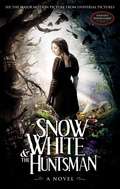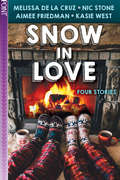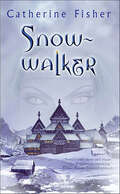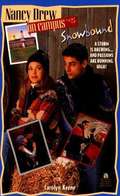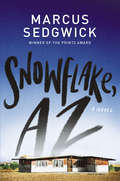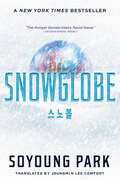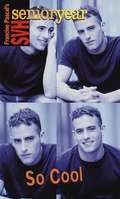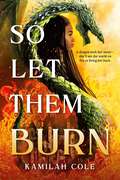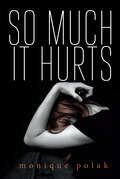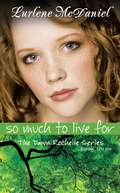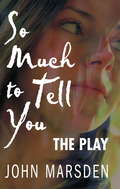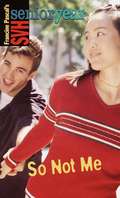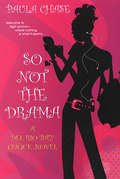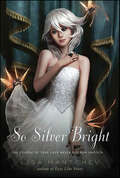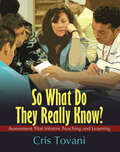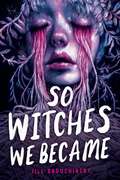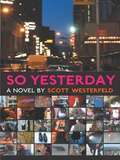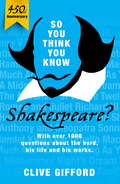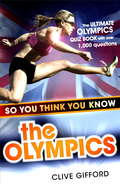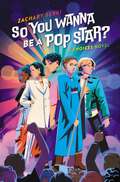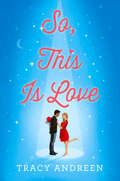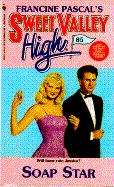- Table View
- List View
Snow White and the Huntsman
by Lily Blake Hossein Amini Evan Daugherty John Lee HancockA breathtaking new vision of a legendary tale. Snow White is the only person in the land fairer than the evil queen who is out to destroy her. But what the wicked ruler never imagined is that the young woman threatening her reign has been training in the art of war with a huntsman who was dispatched to kill her.
Snow in Love (Point Ser.)
by Aimee Friedman Kasie West Nic Stone Melissa de la CruzPerfect for fans of Let It Snow, this irresistible collection of wintry love stories is guaranteed to bring on the warm fuzzies.What's better than one deliciously cozy, swoon-worthy holiday story?Four of them, from some of today's bestselling authors.From KASIE WEST, a snowy road trip takes an unexpected detour when secrets and crushes are revealed.From AIMEE FRIEDMAN, a Hanukkah miracle may just happen when a Jewish girl working as a department store elf finds love.From MELISSA DE LA CRUZ, Christmas Eve gets a plot twist when a high school couple exchange surprising presents.From NIC STONE, a scavenger hunt amid the holiday crowds at an airport turns totally romantic.So grab a mug of hot cocoa, snuggle up, and get ready to fall in love...
Snow in Summer
by Jane YolenAn unforgettable take on a favorite fairy tale by multi-award-winning author Jane Yolen Summer's life in the mountains of West Virginia feels like a fairy tale--her parents dote on her, and she's about to get a new baby brother. But when the baby dies soon after he's born, taking their mother with him, Summer's life turns grim. Things get even worse when her father marries a woman who brings poisons and magical mirrors into Summer's world. Stepmama puts up a pretty face and Summer's father is under her spell, but Summer suspects she's up to no good--and is afraid she is powerless to stop her.
Snow-walker
by Catherine FisherSince Gudrun came from the frozen mists beyond the edge of the world, the Jarl's people have obeyed her in hatred andterror. But the enchantress has one weakness: a son, Kari, banished to a forbidding fortress in the north, never seen by the Jarl's people. In secret they wonder: Are the rumors true? Was he born a monster?Now Jessa and her cousin Thorkil have been exiled to the north, and if they survive the journey, they will find the truth: Is Kari a beast? Or the means to stop the sorceress?
Snowbound (Nancy Drew on Campus #25)
by Carolyn KeeneNancy's out in the cold when a snowstorm hits Wilder U., except she has company-- her costar and rival Michael. Investigating an investment scheme that may be a scam, they get a hot lead that takes them off campus and directly into the path of the blizzard. And when the storm hits, they may make some surprising discoveries--about each other!
Snowflake, AZ
by Marcus SedgwickFrom Printz medalist Marcus Sedgwick, a gripping novel about health—our own and our planet’s—and the stigma of illness. Ash boards a Greyhound bus heading to the place where Bly was last seen: Snowflake, Arizona. Six thousand feet up in the wide red desert, Ash meets Mona, her dog, her goat, and her neighbors, and finds stepbrother Bly, too. In their ramshackle homes, the walls lined with tinfoil, almost all the residents of Snowflake are sick. But this isn’t any ordinary sickness: the chemicals and technologies of modern life are poisoning them. They call themselves canaries, living warning signs that humans have pushed the environment too far, except no one seems to be taking their warnings seriously. The healthy “normies” of Snowflake have written them off as a bunch of eccentrics, and when Ash too falls ill, the doctor’s response is “It’s all in your mind.” Snowflake, AZ contemplates illness and health—both our own and our planet’s. As Ash lives through a cycle of illness and recovery and loss, the world beyond is succumbing to its own affliction: a breakdown of civilization only distantly perceived by Ash and the isolated residents of Snowflake, from which there may or may not be a chance for recovery. This provocative novel by one of our most admired storytellers explores the resilience of love and community in the face of crisis.
Snowglobe (The Snowglobe Duology #1)
by Soyoung ParkNEW YORK TIMES BESTSELLER • The groundbreaking Korean phenomenon that Entertainment Weekly called &“The Hunger Games meets Squid Game&”—now in English for the first time!A COSMOPOLITAN BEST YOUNG ADULT BOOK OF THE YEAR • A KIRKUS REVIEWS BEST BOOK OF THE YEAR&“An immersive and utterly addictive dark dystopian thriller . . . with the eerie, desperate, and exhilarating vibes of Snowpiercer and The Hunger Games.&” —Susan Lee, author of SeoulmatesIn a world of constant winter, only the citizens of the climate-controlled city of Snowglobe can escape the bitter cold—but this perfect society is hiding dark and dangerous secrets within its frozen heart.Enclosed under a vast dome, Snowglobe is the last place on Earth that&’s warm. Outside Snowglobe is a frozen wasteland, and every day, citizens face the icy world to get to their jobs at the power plant, where they produce the energy Snowglobe needs. Their only solace comes in the form of twenty-four-hour television programming streamed directly from the domed city.The residents of Snowglobe have everything: fame, fortune, and above all, safety from the desolation outside their walls. In exchange, their lives are broadcast to the less fortunate outside, who watch eagerly, hoping for the chance to one day become actors themselves.Chobahm lives for the time she spends watching the shows produced inside Snowglobe. Her favorite? Goh Around, starring Goh Haeri, Snowglobe&’s biggest star—and, it turns out, the key to getting Chobahm her dream life.Because Haeri is dead, and Chobahm has been chosen to take her place. Only, life inside Snowglobe is nothing like what you see on television. Reality is a lie, and truth seems to be forever out of reach.Translated for the first time into English from the original Korean, Snowglobe is a groundbreaking exploration of personal identity, and the future of the world as we know it. It is the winner of the Changbi X Kakaopage Young Adult Novel Award.
So Cool (Sweet Valley High Senior Year #3)
by Francine PascalConner doesn't want to want Elizabeth, but how long can he fight his feelings? Conner McDermott likes to be uninvolved... and girls will do anything for him, with no strings attached. When Elizabeth Wakefield starts to wash his car, it should be no big deal. Only there's something about Elizabeth that gets to Conner, something special that sets her apart. But she's not the kind of girl who will settle for what Conner's willing to give.
So Cute You Could Die!: Puppies, Kittens, Bunnies Galore!
by Jennie SummersA gallery of unbelievable cuteness: puppies, kittens, baby chicks, baby otters, baby monkeys, and many, many more!
So Let Them Burn (The Divine Traitors #1)
by Kamilah ColeAn INSTANT National Bestseller! Whip-smart and immersive, this Jamaican-inspired fantasy follows a gods-blessed heroine who&’s forced to choose between saving her sister or protecting her homeland—perfect for fans of Iron Widow and The Priory of the Orange Tree. Faron Vincent can channel the power of the gods. Five years ago, she used her divine magic to liberate her island from its enemies, the dragon-riding Langley Empire. But now, at seventeen, Faron is all powered up with no wars to fight. She&’s a legend to her people and a nuisance to her neighbors. When she&’s forced to attend an international peace summit, Faron expects that she will perform tricks like a trained pet and then go home. She doesn&’t expect her older sister, Elara, forming an unprecedented bond with an enemy dragon—or the gods claiming the only way to break that bond is to kill her sister. As Faron&’s desperation to find another solution takes her down a dark path, and Elara discovers the shocking secrets at the heart of the Langley Empire, both must make difficult choices that will shape each other&’s lives, as well as the fate of their world. "By turns hopeful and devastating, So Let Them Burn is a masterful debut with a blazing heart. I was captivated from beginning to end by Cole&’s sharp, clever prose and by her protagonists—two remarkable sisters with an unforgettable bond." — Chelsea Abdullah, author of The Stardust Thief
So Much It Hurts (Young Adult Novels)
by Monique PolakIris is an aspiring actress, so when Mick, a well-known visiting Aussie director, takes an interest in her, she's flattered. He's fourteen years older, attractive, smart, charming and sexy—in other words, nothing like her hapless ex-boyfriend, Tommy. But when Iris and Mick start a secret relationship, she soon witnesses Mick's darker side, and his temper frightens her. Before long, she becomes the target of his rage, but she makes endless excuses for him. Isolated and often in pain, Iris struggles to continue going to school, where she is preparing for her role as Ophelia. When her family and friends begin to realize that something is terribly wrong, Iris defends her man, but she also takes the first tentative steps toward self-preservation.
So Much to Live For: The Dawn Rochelle Series, Book Three (Lurlene McDaniel Books #3)
by Lurlene N. McDanielFifteen-year-old Dawn Rochelle has survived cancer not once, but twice. No one knows the battle better than she does. That's why Dawn agrees to be a camp counselor for young kids with cancer—the same camp she and her best friend Sandy had attended. Now Sandy is gone. Can Dawn handle the memories? How can she help the kids if she is still hurting so much?
So Much to Tell You: A Performance Version
by John MarsdenThe stage adaptation of John Marsden's award-winning, bestselling novel.'I don't know what I'm doing here. Well, I do really I have been sent here to learn to talk again. Sent here because my mother can't stand my silent presence at home. Sent here because of my face ...' She watches; she dreams. She sees more than they realise. She has worries and fears, hopes and desires. She is troubled; she is angry. Above all, she is lonely. She may be someone you know. She may be you.In So Much to Tell You she tells her story. With humour and insight, with sensitivity and strength, with painful honesty. You will never forget her.'impressive emotional power, style, freshness and originality' CHILDREN'S BOOK COUNCIL OF AUSTRALIA
So Not Me (Sweet Valley High Senior Year #22)
by Francine PascalJade never wanted a boyfriend. She's all about freedom, excitement, the unknown. She's definitely not about getting hurt. But she's messed all that up. Big time. She's fallen for Jeremy Aames. Hard. And now the not-getting-hurt thing is out the window.
So Not The Drama: A Del Rio Bay Clique Novel
by Paula ChaseIn exactly one hour, eighteen minutes, and thirty-five seconds, Mina Mooney will be dipping her pink Nellie timbs into the infamous frosh pit. . . Hoping Del Rio Bay High will live up to her greatest expectations, Mina has big plans for infiltrating the school's social glitterati. After all, she's been mad popular for as long as she can remember-and she isn't about to go from Middle School Royalty to High School Ambiguity. But Del Rio Bay is a big school, so it'll take some plotting to avoid getting lost in the crowd. Good thing she isn't afraid of a little hard work and that her playground peeps-Lizzie, Michael, and JZ-have got her back. But it isn't long before Mina's big plans for securing her social status take a back seat to some drama that was so not expected. Lizzie's scored an invite from the beautiful people that Mina can only dream about, and not only is Michael tripping about being back in school, but now he's beefing with JZ. Worst of all, Mina's sociology class experiment to rid the world-or at least Del Rio Bay High-of prejudice is about to backfire. . . because it might just mean she'll have to rid herself of her very best friend. A novel about friendship, betrayal, and how far some will go for popularity, So Not the Drama takes a fresh and wickedly funny look at planet high school.
So Silver Bright (Theatre Illuminata)
by Lisa MantchevAll Beatrice Shakespeare Smith has ever wanted is a true family of her own. And she's close to reuniting her parents when her father disappears. Now Bertie must deal with a vengeful sea goddess and a mysterious queen as she tries to keep her family – and the Theatre Illuminata – from crumbling. To complicate it all, Bertie is torn between her two loves, Ariel and Nate.
So This Is Ever After
by F.T. LukensAn instant New York Time bestseller! Carry On meets Arthurian legend in this subversive, &“delightfully original and whimsical&” (Kirkus Reviews) young adult fantasy about what happens after the chosen one wins the kingdom and has to get married to keep it…and to stay alive.Arek hadn&’t thought much about what would happen after he completed the prophecy that said he was destined to save the Kingdom of Ere from its evil ruler. So now that he&’s finally managed to (somewhat clumsily) behead the evil king (turns out magical swords yanked from bogs don&’t come pre-sharpened), he and his rag-tag group of quest companions are at a bit of a loss for what to do next. As a temporary safeguard, Arek&’s best friend and mage, Matt, convinces him to assume the throne until the true heir can be rescued from her tower. Except that she&’s dead. Now Arek is stuck as king, a role that comes with a magical catch: choose a spouse by your eighteenth birthday, or wither away into nothing. With his eighteenth birthday only three months away, and only Matt in on the secret, Arek embarks on a desperate bid to find a spouse to save his life—starting with his quest companions. But his attempts at wooing his friends go painfully and hilariously wrong…until he discovers that love might have been in front of him all along.
So What Do They Really Know?: Assessment That Informs Teaching and Learning
by Cris TovaniSo What Do They Really Know? Cris Tovani explores the complex issue of monitoring, assessing, and grading students' thinking and performance with fairness and fidelity. Like all teachers, Cris struggles to balance her student-centered instruction with school system mandates. Her recommendations are realistic and practical; she understands that what isn't manageable isn't sustainable. Cris describes the systems and structure she uses in her own classroom and shows teachers how to use assessments to monitor student growth and provide targeted feedback that enables students to master content goals. She also shares ways to bring students into the assessment cycle so they can monitor their own learning, maximizing motivation and engagement. So What Do They Really Know? includes a wealth of information: Lessons from Cris's classroomTemplates showing how teachers can use the workshop model to assess and differentiate instructionStudent work, including samples from linguistically diverse learners, struggling readers, and college-bound seniorsAnchor charts of student thinkingIdeas on how to give feedbackGuidelines that explain how conferring is different from monitoringSuggestions for assessing learning and differentiating instruction during conferencesAdvice for managing ongoing assessmentCris's willingness to share her own struggles continues to be a hallmark of her work. Teachers will recognize their own students and the challenges they face as they join Cris on the journey to figure out how to raise student achievement.
So Witches We Became
by Jill Baguchinsky★ "Skillfully crafted and sharply descriptive with horrifying imagery to spare... Powerfully angry and vengeance-laden, with terrifying and very human monsters." –School Library Journal, starred reviewA queer, feminist spin on Stephen King&’s The Mist, this ode to female-rage is a perfect pick for fans of She Is a Haunting, and a reminder that if "boys will be boys", girls will fight back. For high school senior Nell and her friends, a vacation house on a private Florida island sounds like the makings of a dream spring break. But Nell brings secrets with her—secrets that fuse with the island's tragic history, trapping them all with a curse that surrounds the island in a toxic, vengeful mist and the surrounding waters with an unseen, devouring beast. Getting out alive means risking her friendships, her sanity, and even her own life. In order to save herself and her friends, Nell will have to face memories she'd rather leave behind, reveal the horrific truth behind the encounter that changed her life one year ago, and face the shadow that's haunted her since childhood. Easier said than done. But when Nell's friends reveal that they each brought secrets of their own, a solution even more dangerous than the curse begins to take shape. Reading like a YA feminist spin on Stephen King&’s The Mist, So Witches We Became is a diverse, queer horror about female friendship, the emotional aftermath of surviving assault, and how to find power in the shadows of your past. Step into your witchy power or be swallowed by the curse–the choice is yours.
So Yesterday
by Scott WesterfeldEver wonder who was the first kid to keep a wallet on a big chunky chain, or wear way-too-big pants on purpose? What about the mythical first guy who wore his baseball cap backwards? These are the Innovators, the people on the very cusp of cool.<P><P> Seventeen-year-old Hunter Braque's job is finding them for the retail market. <P> But when a big-money client disappears, Hunter must use all his cool-hunting talents to find her. Along the way he's drawn into a web of brand-name intrigue-a missing cargo of the coolest shoes he's ever seen, ads for products that don't exist, and a shadowy group dedicated to the downfall of consumerism as we know it.
So You Think You Know: Shakespeare
by Clive GiffordIn which play would you find the characters, Bottom, Quince, Puck and Titania? How many of Shakespeare's history plays featured a King called Henry in their title? Does Juliet die by poison, stabbing herself or throwing herself off of a balcony? So you've read Shakespeare's plays, maybe seen them performed. Now you can test whether you really know about his plays and his extraordinary life. There are quizzes on Shakespeare's life and times including questions on plays and theatres of the time; the 15 most popular plays each has a dedicated quiz; there are 5 additional quizzes covering Shakespeare's remaining works - Poems & Sonnets/ Histories/ Tragedies/ Comedies/ Romances.
So You Think You Know: The Olympics
by Clive GiffordSo you think you all about the Olympics? Have a go at these:Which country's population was granted a day's holiday when its men's football team won gold at the 2000 Olympics?At the 2012 games, only two stadiums used for the football events are Premier League grounds. Can you name both?Name one of the three sports that George Eyser, a man with a wooden leg, won at the 1904 Olympics.Whether you want to test your knowledge or are keen to learn more about the biggest sporting event EVER, here are over 1000 Olympic teasers that cover everything from the history of the games and sports knowledge to weird and wonderful trivia that will put even gold medallists to the test and will make sure that you're ready for this summer's Olympics!
So You Wanna Be A Pop Star?: A Choices Novel
by Zachary SergiAn energetic, interactive YA novel about five solo pop artists navigating drama, finding their sound, and discovering what it truly takes to chase their dreams of music stardom after being forced into a pop group together. Everly Brooks knows she has what it takes to be the next big singer-songwriter. At least, that's if she could get her onstage presence to stop feeling so wooden and blossom like her rich, moving lyrics. The reality signing competition, SO YOU WANNA BE A POP STAR? is her chance at proving to the world—and herself—that her talent and artistry can mean something more than just live streams and online videos. Vinny Vecchi thought he was heading toward a life full of makeup, wigs, and werking it on the drag stages of NYC. But a powerful diva voice is a precious thing to waste and, in need of money to make his drag dreams come true, SO YOU WANNA BE A POP STAR? is the next best thing. However, surrounded by competitors with clear brands and sharpened musical identities, he wonders if he can break through while still discovering himself. When a group performance on the show goes viral overnight, Everly and Vinny find their careers unexpectedly tied together. Along with their competitors—influencer Dea Seo, pop-punk CeCe Winnifred, and heartthrob Stern Green—these five artists are forced to become the newest pop super group: Jeweltones. You, the reader, get to make choices that will make or break Everly, Vinny, and the group&’s meteoric rise in this interactive novel. Will you mend the cracks to help Jeweltones shine bright, or will they burn out under pressure? The choices are yours to make!
So, This Is Love
by Tracy AndreenIn the sequel to Tracy Andreen's debut romantic comedy So, This Is Christmas, we follow Finley and Arthur back to Barrington Academy for a swoony semester.Perfect for fans of Tell Me Three Things and Anna and the French Kiss!Finley and Arthur are back at boarding school and neither quite knows where the other stands—are they couple? Are they not a couple? What does one magical Christmas Eve kiss in Oklahoma mean for their relationship status? This confusion isn't helped by the re-entry of old enemies into their school lives, especially ones that may or may not be crushing on Arthur. Finley is at a loss when navigating the complexities of her new (maybe) relationship, which could very well turn into love. . . if she doesn't blow it.So, This Is Love is a perfect read for the Valentine's Day season, or for anyone looking for a delightful romantic comedy that has just a dash of drama. Once again, Tracy Andreen has proven that no one writes a holiday rom-com like her.
Soap Star (Sweet Valley High #85)
by Francine Pascal Kate WilliamWhen Jessica and Elizabeth win roles in Jessica's favorite soap, which had been looking for a set of beautiful blonde twins for a special week-long storyline, Jessica becomes carried away with the publicity.
